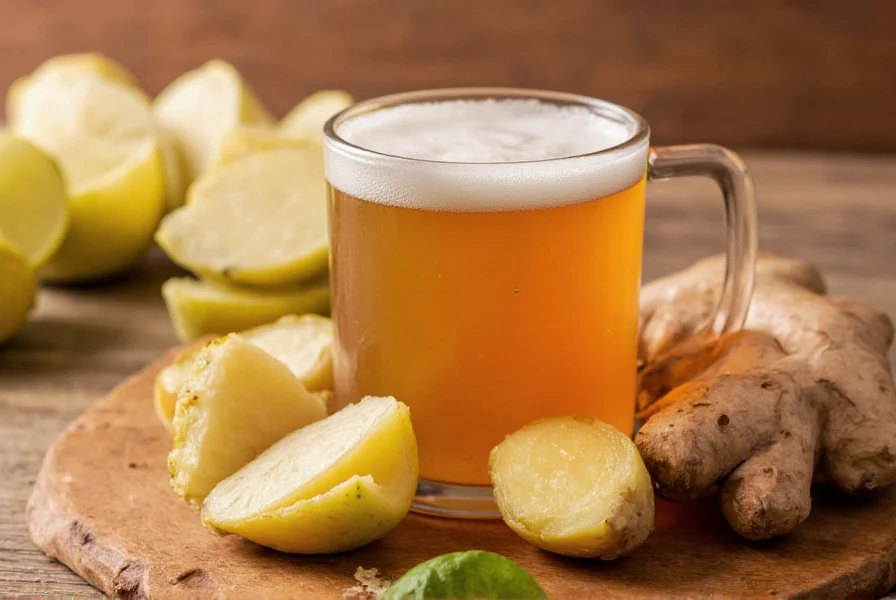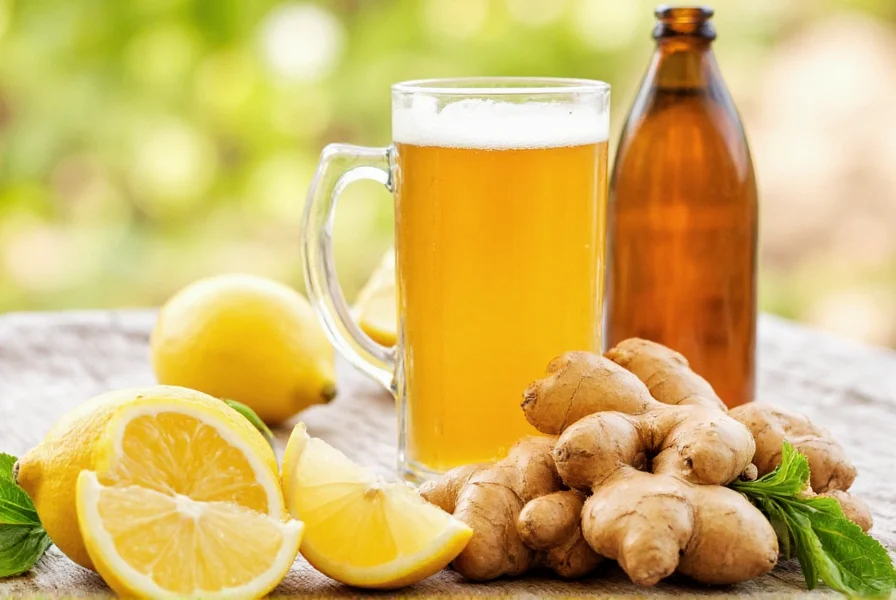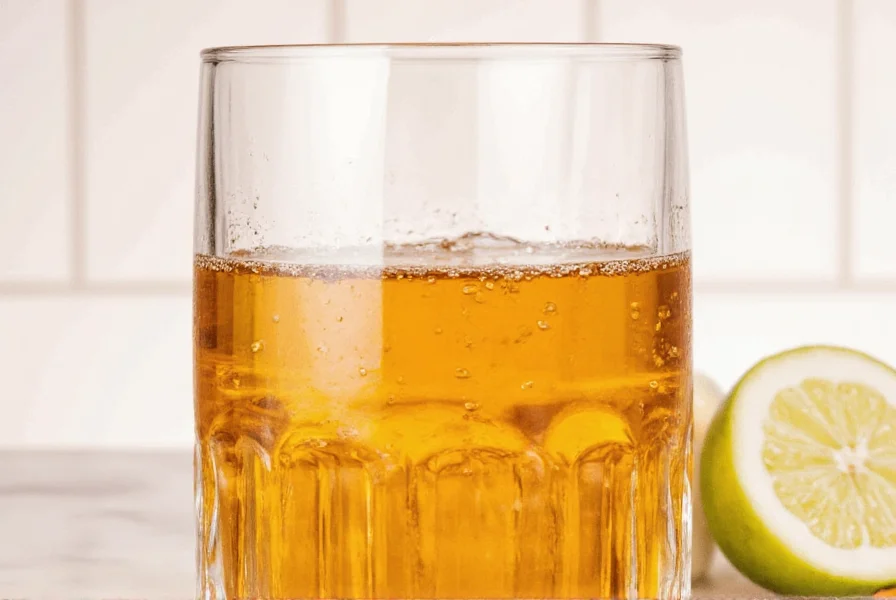If you've searched for \"ginger alw,\" you're likely looking for information about ginger ale, the popular ginger-based soft drink. This comprehensive guide explores what ginger ale actually is, its potential health benefits, different varieties available, and how to use it effectively for wellness purposes.
What Exactly Is Ginger Ale?
Ginger ale is a non-alcoholic carbonated beverage flavored with ginger root. Unlike its more potent cousin ginger beer, commercial ginger ale typically contains a milder ginger flavor and higher carbonation. The beverage originated in Ireland during the mid-1800s and has since become a global staple, particularly valued for its potential digestive benefits.
The production process involves creating a ginger syrup from fresh ginger root, sugar, and water, which is then combined with carbonated water. Traditional \"golden\" style ginger ale uses more ginger and has a spicier profile, while \"dry\" or \"Canadian\" style features a lighter ginger flavor preferred by many major soft drink manufacturers.
| Style | Ginger Content | Flavor Profile | Common Uses |
|---|---|---|---|
| Golden-style | Higher (2-4%) | Spicy, robust ginger flavor | Medicinal use, cocktail mixer |
| Dry-style | Lower (0.5-1.5%) | Milder, sweeter taste | Everyday beverage, soft drink alternative |
Health Benefits of Ginger Ale: What Research Shows
Ginger itself contains bioactive compounds like gingerols and shogaols that have been studied for their potential health effects. When evaluating ginger ale for nausea relief and digestive support, consider these evidence-based insights:
Multiple clinical studies suggest ginger may help reduce nausea from various causes including morning sickness, motion sickness, and post-operative nausea. However, the effectiveness of commercial ginger ale depends significantly on its actual ginger content. Many mainstream brands contain minimal real ginger extract, relying instead on artificial flavors.
For those seeking ginger ale benefits for upset stomach, look for products listing \"ginger root extract\" high in the ingredients. The sugar content in many commercial varieties (typically 20-30g per 12oz) may counteract some benefits for certain health conditions. Homemade ginger ale or specialty brands with higher ginger content generally provide more therapeutic value.

Ginger Ale vs. Other Ginger Beverages
Understanding the differences between ginger-based beverages helps you select the right option for your needs:
- Ginger beer traditionally contains higher ginger concentration (3-5%) and is often brewed through fermentation, resulting in a stronger, spicier flavor. Some varieties contain trace alcohol from fermentation.
- Ginger tea is made by steeping fresh or dried ginger in hot water, providing a more concentrated ginger experience without carbonation or added sugars.
- Commercial ginger ale typically has the lowest ginger content among ginger beverages, with many popular brands containing primarily artificial flavors rather than real ginger extract.
Practical Uses for Ginger Ale Beyond Drinking
While many people consume ginger ale as a standalone beverage, it has several practical applications:
For digestive discomfort, sip small amounts of room-temperature ginger ale slowly. The carbonation may help settle an upset stomach for some individuals, though others might find the bubbles aggravating. When using ginger ale for nausea relief, choose varieties with higher ginger content and lower sugar.
Chefs often use ginger ale as a marinade component for meats, particularly chicken and pork, where the carbonation helps tenderize while the ginger adds flavor. It also serves as a base for non-alcoholic \"mocktails\" and can be frozen into ginger-flavored ice cubes for beverages.

Considerations When Choosing Ginger Ale
Not all ginger ales offer equal benefits. When selecting a product for potential health benefits rather than just taste, consider these factors:
- Check the ingredient list for \"ginger root extract\" or \"real ginger\" rather than \"natural flavors\"
- Compare sugar content - many brands contain 20-30g per serving
- Consider homemade options for maximum ginger potency and minimal additives
- Be aware that \"diet\" versions often replace sugar with artificial sweeteners that may affect digestion differently
For those managing blood sugar or diabetes, the high sugar content in traditional ginger ale may be problematic. In these cases, sugar-free varieties or diluted ginger tea might be better alternatives while still providing ginger's potential benefits.
Frequently Asked Questions
Is ginger ale good for nausea and upset stomach?
Ginger ale may help with nausea when it contains sufficient real ginger extract. The effectiveness depends on the actual ginger content, as many commercial brands contain minimal ginger. For best results, choose ginger ales listing ginger root extract high in the ingredients or consider homemade versions with fresh ginger. The carbonation may provide additional soothing effects for some people, though others might find it aggravating.
What's the difference between ginger ale and ginger beer?
Ginger beer traditionally contains higher ginger concentration (3-5%) compared to ginger ale (typically 0.5-4%), resulting in a stronger, spicier flavor. Ginger beer is often brewed through fermentation, which may produce trace alcohol, while ginger ale is usually carbonated without fermentation. Golden-style ginger ale has more ginger than dry-style but still less than most ginger beers.
Can I make ginger ale at home for better health benefits?
Yes, homemade ginger ale typically contains more actual ginger and fewer additives than commercial varieties. A basic recipe involves creating a ginger syrup from fresh grated ginger, sugar, and water, then combining it with carbonated water. For fermentation-based versions, you'll need a ginger beer plant or other culture, though these may contain trace alcohol. Homemade versions allow you to control sugar content and ginger potency for maximum potential health benefits.
Does ginger ale help with morning sickness during pregnancy?
Ginger itself has been studied for pregnancy-related nausea relief, but the effectiveness of commercial ginger ale depends on its actual ginger content. Many popular brands contain insufficient ginger to provide significant benefits. If using ginger ale for morning sickness, choose varieties with higher ginger content or consider ginger tea, which typically delivers more concentrated ginger. Always consult with your healthcare provider before using ginger products during pregnancy.











 浙公网安备
33010002000092号
浙公网安备
33010002000092号 浙B2-20120091-4
浙B2-20120091-4